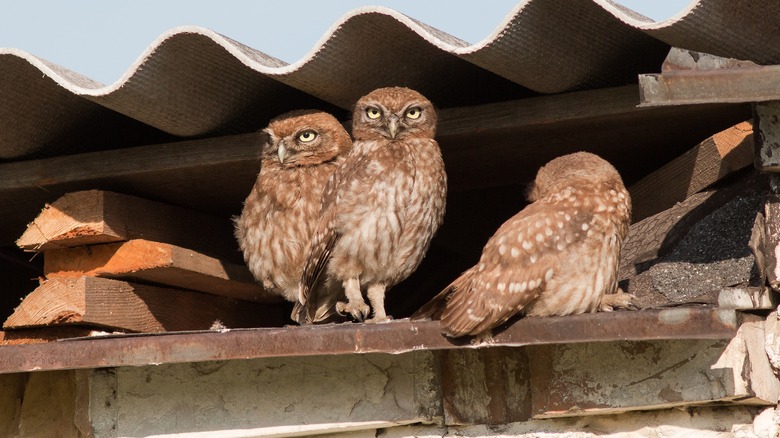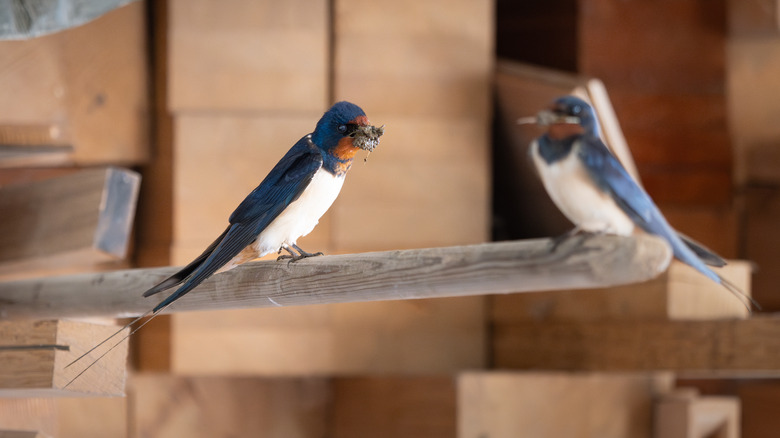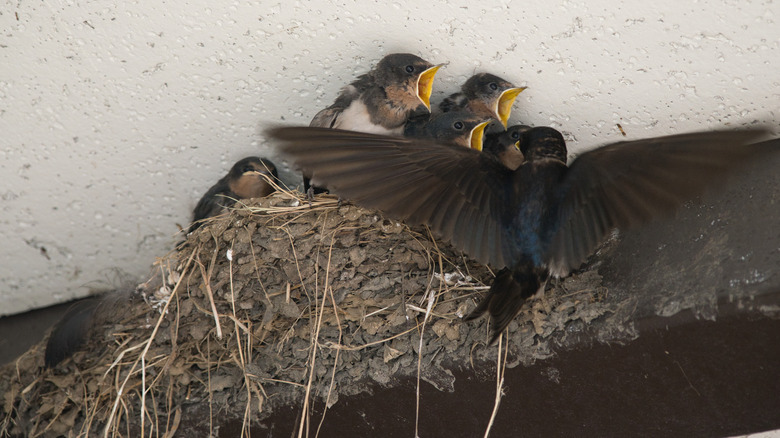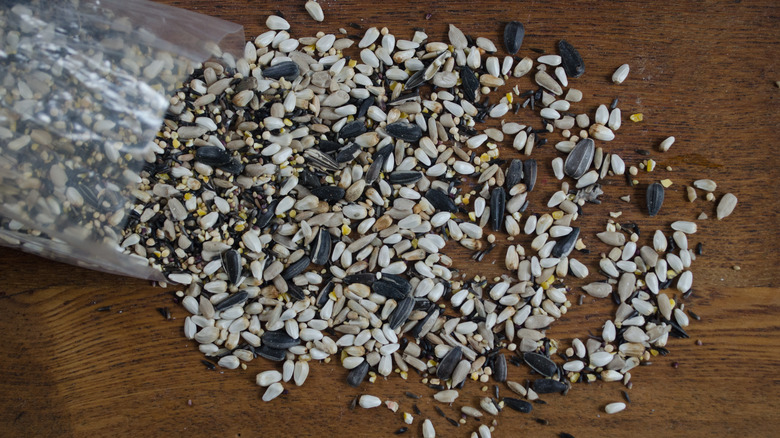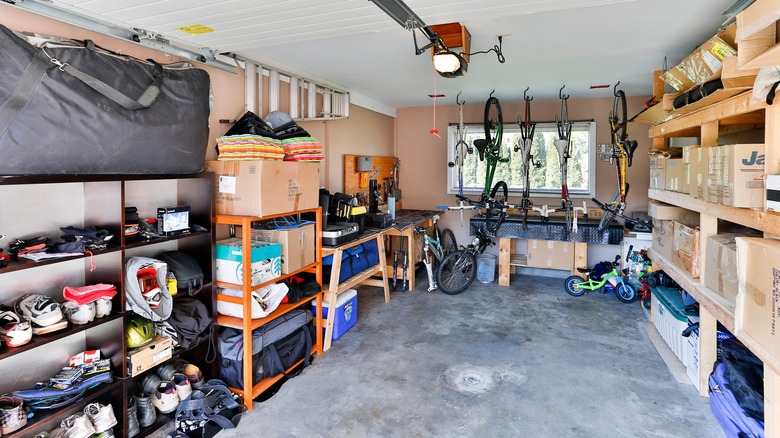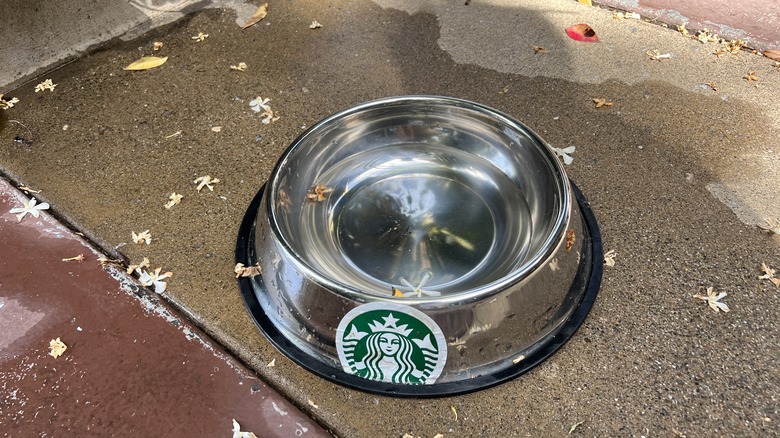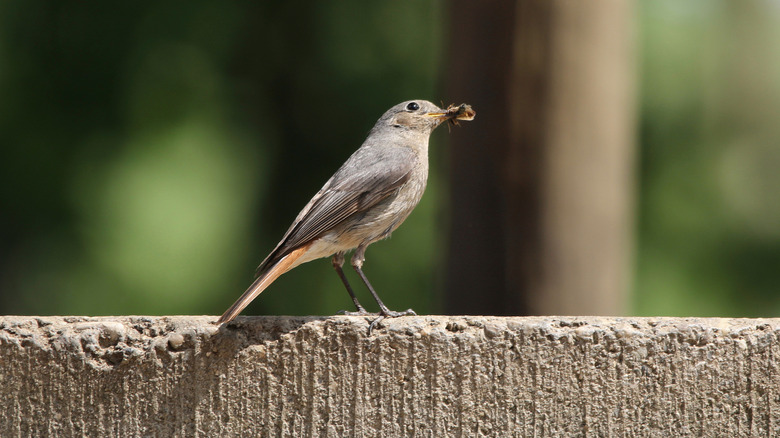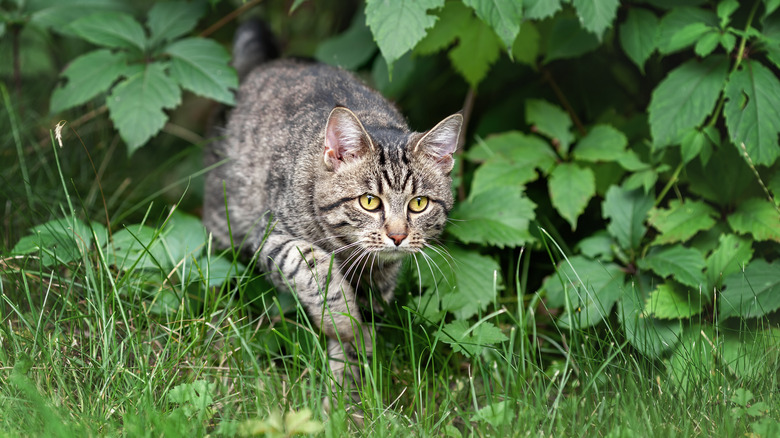Why Birds Are So Attracted To Your Garage (& How To Prevent Them Coming Inside)
We may receive a commission on purchases made from links.
Having birds in your garage can be a real hassle. From dealing with noisy chicks every morning to cleaning piles of bird poop off your car — or even seeing your outside food stash destroyed — most people want a bird-free garage. Luckily, there are a few simple reasons that birds tend to show up. And if you know them, you can take steps to keep the birds out. Robyn Bailey, project leader for NestWatch at the Cornell Lab of Ornithology, spoke exclusively with House Digest about why these feathered friends are so interested in your garage.
She gave enlightening reasons for the birds' behavior, as well as a few tips for keeping them on the outside. It is important to know that harming birds is never the answer, no matter how much you don't want them in your garage. You might not realize this, but it is also illegal to move or destroy most nests under the Migratory Bird Treaty Act (MBTA). To keep birds out of your garage before they can even set up a nest, keep reading for a list of actionable tips.
They need a place to roost
If you haven't seen birds in your garage before, then roosting is one of the most likely reasons they are inside of it now — especially if the weather is bad. "Roosting is another way of saying 'sleeping' or 'resting,' and a garage is a dry sheltered spot to spend the night," Bailey shared. "Who doesn't want a warm, dry place to sleep? It's probably just for one night, but I did have an Eastern Phoebe who slept in my garage for a while during a period when the door needed a repair."
To prevent this, you should be vigilant about keeping your garage sealed off. This includes keeping the garage's mechanical and pedestrian doors shut, as well as other windows and larger gaps in things like air vents. If there are any missing or cracked window panes, repair the cracked glass or replace it. Check for small holes and crevices between doors, windows, and the wall, as smaller birds can slip through tiny spaces. However, before doing any of this, carry out a quick check to make sure you aren't sealing any animals inside your garage. If you do all this and they still get in, don't worry, as chances are it won't be for long. "I once heard about a person that had a screech-owl roosting in their garage one night, which is very uncommon," Bailey said, adding that "if you do notice a bird sleeping in your garage, consider leaving it be since it will very likely leave in the morning."
They are building a nest
If you spot certain bird species in the rafters of your garage, and they aren't just enjoying a once-off roost, Bailey thinks it's likely they're building a nest. She explained that garages can offer lots of things birds look for in a nesting site, including protection from the rain, harsh sun, and predators. Bailey told House Digest that "there are some birds that associate with human habitations that are particularly likely to nest in a garage (as opposed to on the outside), like Carolina Wren and Bewick's Wren. They seek out nest sites within nooks and crannies, and a typical garage has plenty of those."
While you might be able to just shoo single birds away, if they have already built a nest, your options for removal are limited. As opposed to roosting birds that will probably leave in the morning, "Nests are a different story," Bailey warned. "Nests and eggs are legally protected from destruction or removal, just like the birds themselves. If you find a bird nesting in your garage, a possible solution is to leave a small window opening or just don't close the door all the way (so they can come and go)." To prevent this from happening in the future, or to discourage other birds from joining them, there is still something you can do. Make other areas of your yard more appealing to nesting birds. For example, there's many a DIY birdhouse you can build to give these feathered friends another place to go. If they have a few warm, safe alternatives available on your property, they might be less likely to choose your garage. If you want more tips on supporting nesting birds and working with an inconvenient nest, Bailey advises visiting the NestWatch website.
They are looking for food
Just like any other wild animal, birds will often go after the easiest food source available to them. If something in their diet is on offer inside your garage, then birds might stop by to enjoy the buffet. While it doesn't happen all the time, if you have pet food sitting out or use your garage as a pantry, you might create a bird problem. When asked why birds would want to enter a garage, Bailey said, "Seeking out food would be a less common reason, although I have had this happen when I used to store birdseed in the garage and didn't clean up any spilled seed right away." However, she added that pet food could be an attraction to certain species, saying, "Some birds like crows and jays will go after kibble, but if you store it in an airtight container this shouldn't be a problem. Mice/rats would be a bigger reason to keep kibble secured."
Yet as larger birds of prey eat mice and rats, you don't want your garage to look appetizing to them, either. As Bailey recommends, be sure to clean up any spills, whether it's birdseed, pet food, or even last night's dinner because the garbage bag broke, right away. You should also store birdseed, pet food, plus any human food, in sealed containers. Preferably with clasps, snaps, or buckles, so a nimble raccoon or clever crow can't just knock off the lid. Finally, move any bird feeders you may have away from the entrances to your garage, so you don't have any accidental fly-ins.
They are curious about your garage
Some species of birds are very curious and outgoing. For example, ravens, magpies, and crows tend to be intelligent, can complete complex tasks, and have big forebrains, the region associated with memory. Because of their high levels of curiosity, you might find certain birds are entering your garage simply because they are interested in the items inside. These could be potential nest-building materials like fabrics, shredded paper, ropes from holiday decorations, old clothes, or pet toys. They could also remember that the garage is where the food comes from, etc. Contrary to popular belief, most bird species are not just after things that are shiny.
To keep curious birds out of your garage, the answer is simple: Keep it shut. However, since you might forget to close the door behind you a time or two, or a determined avian could slip in through an air vent, there are a few other things you can do. The first is to clean out your garage and throw away or donate any older items you don't have use for, but birds would, like open bags of wood chips, ratty towels with loose strings, etc. Then, from what you decide to keep, be sure to store it in closed containers so birds don't have a chance to peck at it, whether out of sheer curiosity or in a bid to gather nest materials.
They need a water source
Birds might also be flocking to your garage because they are thirsty or in need of a bath. Birds love to be clean and frequently take dust baths to clean their feathers. Yet, if water is available, it is often the preferred method. So, if you have water bowls for your pet sitting out, birds might stop by for a drink or a dip on a hot day. If you have a workspace with a sink, the same reason might apply.
In this instance, the best way to keep birds out of your garage is to offer plenty of water sources outside of it. If you don't have a birdbath in your yard already, consider installing one. There are tons of ways to DIY a charming birdbath, ranging from repurposing clay plant pots to placing a tray on a tree stump. If you love the sound of gently splashing water, you can create a two-in-one feature by adding a fountain (solar-powered versions like this aerator from Walmart don't require complicated installation). There are many pros to having a fountain in your birdbath, including keeping the water moving to avoid stagnation, plus the sight and sound of the splashing droplets can attract birds. Finally, don't forget to place pets' water bowls outside, away from the entrance to your garage, to deter birds' entry.
They are helping you with your bug problem
Birds love bugs! You might have too many bugs in your garage, so they are stopping by to eat all the insects inside. Lots of bird species are insectivores, including the eastern phoebe, great crested flycatcher, yellow-throated vireo, and red-eyed vireo, just to name a few. Insectivores might eat beetles, moths, flies, ants, crickets, spiders, roaches, termites, and more.
Cutting off this food source is a win/win because having insects in your garage doesn't tend to work out well for the human residents, either. First, seal up your garage to make sure pests can't get in through rotted wood baseboards or cracks in the walls. Next, consider spraying the inside and outside of your garage's perimeter with pesticide, or even better, try out some non-toxic pest control hacks. The final step would be committing to keeping pests out of your garage storage cabinets and surrounds. If your trash cans are in your garage, cleaning the bins out every once in a while so they aren't a feasting ground for flies can help. You can use mothballs with any fabrics stored to keep fish moths away, while ensuring things like holiday decorations are in airtight containers (also to guard against silverfish). As the insect population in your garage drops, you might notice that the number of hungry birds inside does too.
There are predators around
Birds might be seeking shelter in your garage as they wait for a predator to leave the area. Birds have many predators that can be found in the average garden, including snakes, foxes, cats, dogs, and even other, larger birds. The deep, dark reaches of your garage are the perfect place for a wary animal to wait things out. To prevent this from happening, you can make your yard more hostile to predators and keep it safer for birds. If they don't need to seek shelter, you probably won't find them inside as often.
It is perhaps easier to control your house pets than wild animals. You can begin by building a catio for your feline fur babies instead of letting them roam freely around your yard, and discourage your dogs from chasing birds. Next, to keep out foxes, be sure that food for them (like a full trash can) is secure and your vegetation is cut back so the foxes can't hide out amongst it. For snakes, remove any rotten tree stumps or large piles of wood and debris, which are both the types of places they love to hide.
